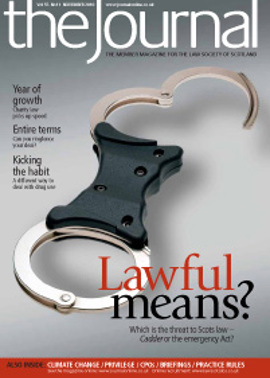From the Brussels office

Agreement reached on late payments
After long negotiations, an agreement has been reached between the European Parliament and Council on the proposal to amend the Directive on combating late payments in commercial transactions. MEPs struck a deal whereby a limit of 30 days would be set for payments from the private and public sector. This can only be extended in exceptional circumstances and can be no longer than 60 days for public authorities. The other main area of disagreement related to the rate of statutory interest payable, now settled at 8%, and the verification period for checking that the goods or services comply with the contract, now set at 30 days. An extension of this period is subject to the agreement of both parties and must not be grossly unfair to the creditor.
Parliament votes to enhance mothers' rights
On 20 October, at first reading, the European Parliament voted on the European Commission's proposal to reform the rules relating to maternity leave in the EU. The Parliament voted to extend minimum maternity leave from 14 to 20 weeks with full pay, thus going further than the Commission's original proposal of 18 weeks with six weeks of guaranteed full pay. The Parliament also voted to grant fathers two weeks of paternity leave at full pay within the period of maternity leave. Further amendments were adopted to extend the protection against the dismissal of pregnant workers until six months after their maternity leave and to strengthen their rights on return to work following maternity leave. The UK and other member states have voiced their concerns over the potential costs of these changes, which have been said to be over €2 billion a year for the UK. Forthcoming discussions on the proposal are therefore likely to prove controversial. The next stage is for the Council to take its position.
Electronic public procurement consultation launched
The question of how to speed up public procurement procedures in the member states through expanding the use of e-procurement is the key question behind a consultation launched on 18 October by the European Commission. The green paper seeks views on: how to exploit fully the potential of e-procurement procedures so as to speed up and simplify the process; what tools and legislation would be needed to do this; and how to allow operators in another member state to use this system. The consultation is open until 31 January 2011.
Financial institutions set for further change
The ongoing overhaul of EU financial systems continues, with several developments recently announced regarding the governance of banks and other systemic financial institutions. In terms of replenishing public finances following the crisis, on 7 October the European Commission voiced its support for a levy on bank profits. Progress on a financial transaction tax however, may need to wait until a global agreement is decided. The European Council was due to discuss the matter at its meeting on 28 and 29 October, and the Commission intends to produce policy initiatives in 2011.
The Commission published a green paper on audit policy on 13 October with a view to bolstering the role of auditing in companies' risk management. The paper discusses the audit market and asks questions on issues such as the role of auditing, communication to stakeholders, independence of auditors and the shape of the audit market itself. Finally, on 20 October the Commission announced a communication detailing a framework for crisis management regarding systemic financial institutions, such as banks. The forthcoming proposals would provide the tools to allow cross-border banks to fail in a way which prevents further financial instability and cost to taxpayers, as well as putting in place measures on prevention and early supervisory intervention. Legislative proposals on this are due by spring 2011.
Cross border supply of service: MEPs examine progress
The Directive on services in the internal market was due to be implemented into national law by the end of December 2009. As the current infringement investigations by the European Commission suggest, this process has not gone smoothly. A number of Member States are behind in the process of changing their national rules to give effect to this instrument which seeks to cut red tape and make it easier to supply services in another Member State. Administrative cooperation is a core part of this approach but the sheer size and scale of this project is causing delay. In a hearing held by the European Parliament Internal Market and Consumer Protection Committee on 20 September, MEPs heard of a number of problems still outstanding. There was confusion over the overlap with the Directive on recognition of professional qualifications and the practical aspects around the Points of Single Contact designed to be "one-stop-shops" for service suppliers. On a positive note, the UK Government representative highlighted the advantages to new business and the savings made from a reduction in administrative costs overall. The Services Directive will be further discussed by the Council in December and a follow-up report may be produced.
In this issue
- In the wee small hours
- Keeping the law in line
- Only a civil matter?
- Mapping the future
- Rights under question
- What help?
- Shunned lifelines
- The whole deal
- The limits of privilege
- Drugs: a user issue
- Law reform update
- Constitution out for views again
- Tackling bullying and harassment
- First registered paralegals confirmed
- Mediation lawyers can apply
- Look out for the rules reviews
- From the Brussels office
- Are they being served?
- Ask Ash
- Paper, pixel and process
- Check yourself
- Call for restraint
- A step back from compensation?
- Key to compliance
- Website review
- Resource issue
- Book reviews
- Stand up and be counted
- Cool drafting
- Partners in purchase






